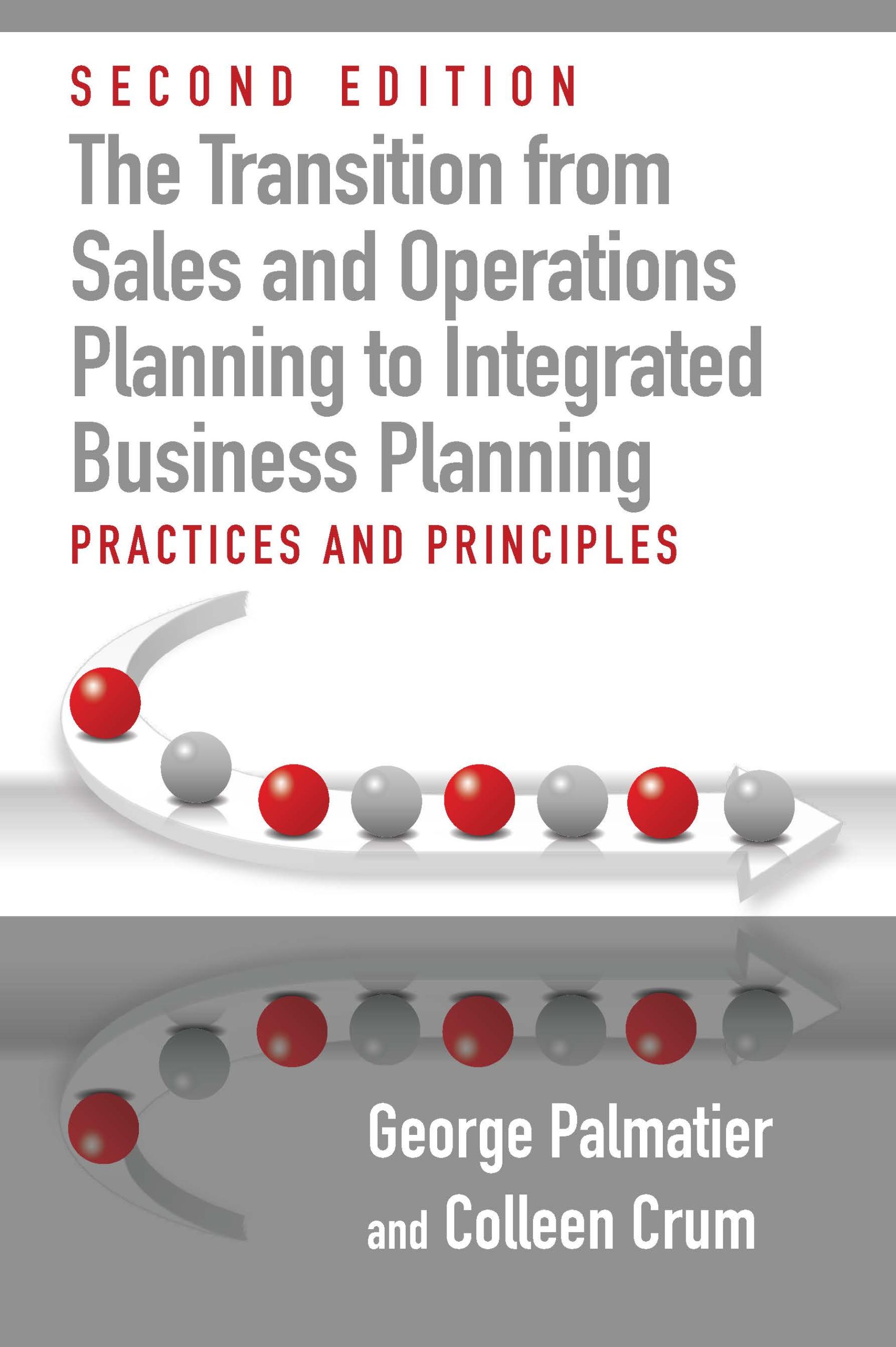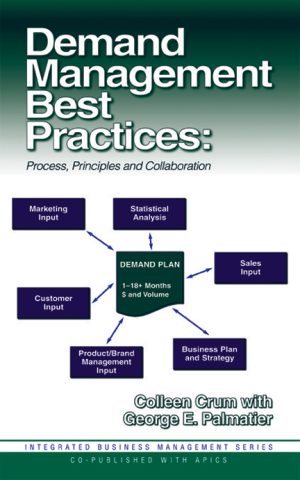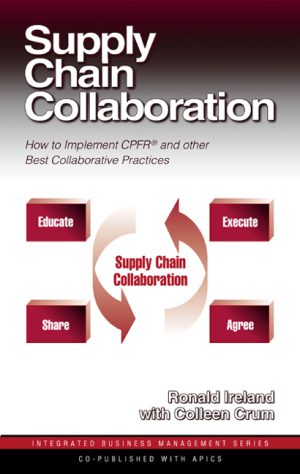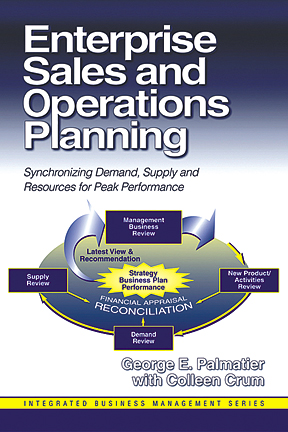The Transition from Sales and Operations Planning to Integrated Business Planning, Second Edition
$49.95
Practices and Principles
By George Palmatier and Colleen Crum
Hardcover, 6×9, 318 pages
ISBN: 978-1-60427-191-1
e-ISBN: 978-1-60427-845-3
September 2022
Description
Forward-thinking companies are evolving their Sales and Operations Planning processes into Integrated Business Planning (IBP) for a simple reason: doing so generates far greater gains in their business results. In an easy-to-digest format, this book uses a fictional company to show how to transition to IBP and further explains how companies are linking strategy to execution through the IBP process.
Since soft skills often make the difference between success and failure in an IBP implementation, this seminal work also offers more than 200 business principles that can often be forgotten when you are in the trenches of daily business battles. These principles address collaboration, decision making, aligning the executive team, managing change in the organization, and much more.
Key Features
- Explains what businesses gain from using IBP to link strategy to execution
- Shares strategies and values that help companies achieve faster results when using IBP to manage the business
- Features numerous business and life principles that will help you both in and out of the workplace
- WAV features three downloadable appendices to continue learning outside of the pages of the book—available from the Web Added Value™ Download Resource Center at jrosspub.com
About the author(s)
George E. Palmatier has assisted many companies that make everything from soup to satellites in implementing integrated management processes. He is recognized as an expert on Integrated Business Planning (IBP), Sales and Operations Planning (S&OP), Demand Management, and Integrated Strategy Management. He also has deep experience with Enterprise Resource Planning, Integrated Supply Chain Management, and Integrated Product Development.
With more than forty years of experience in industry and as a principal with Oliver Wight Americas, George has a thorough knowledge of how to achieve sustained results in improving business performance. During eleven years as Vice President of Sales and Marketing at Bently Nevada Corporation, George was responsible for bringing the sales and marketing functions into a well-orchestrated business management process. Bently Nevada was one of the pioneers in developing and implementing S&OP and using it as a truly integrated management process.
In addition to this book and his many white papers, George has authored or coauthored three other titles: The Marketing Edge, Enterprise Sales and Operations Planning, and Demand Management Best Practices.
Colleen Crum is a thought leader and innovator in Demand Management, Integrated Business Planning, and Sales and Operations Planning. She has helped develop methodologies that enable companies to successfully implement and sustain integrated management processes to quickly achieve financial benefit. Before retiring as a consultant with Oliver Wight, she assisted companies across the manufacturing spectrum, including chemicals, consumer goods, food and beverage, electronics, biotechnology, aerospace, and defense.
In addition to coauthoring this book and authoring many white papers, Coco has coauthored three other books: Enterprise Sales and Operations Planning, Demand Management Best Practices, and Supply Chain Collaboration. During retirement, Coco has served as an editor for Oliver Wight and is an author of children’s books.
Table of Contents
Preface
The Company and Players
Prologue
Chapter 1: The Proposition
Chapter 2: The First Step
Chapter 3: Common Understanding
Chapter 4: Stuck
Chapter 5: The Difference Between Sales and Operations Planning and Integrated Business Planning
Chapter 6: Consensus on the Basics
Chapter 7: Connection to Execution
Chapter 8: Integrated Business Planning as the Primary Way to Manage the Business
Chapter 9: Revisiting Consensus
Chapter 10: Implementation
Chapter 11: Getting Started
Chapter 12: Good Decision Making in Difficult Times
A Collection of Business Management Principles I Wish I Had Understood Earlier
Section 1: Accountability
Section 2: Aggregate Planning
Section 3: Align, Integrate, Synchronize
Section 4: Annual Planning
Section 5: Behaviors
Section 6: Change and Transformation
Section 7: Collaboration
Section 8: Communication
Section 9: Consensus
Section 10: Control of the Business
Section 11: Customer Focus
Section 12: Decision Making
Section 13: Demand Management
Section 14: Disciplined, Regular, Routine
Section 15: Do What You Say You Are Going to Do
Section 16: Financial Perspective
Section 17: Foundational Principles and Behaviors
Section 18: Improvement Methodology
Section 19: Information Technology
Section 20: Integrated Business Planning
Section 21: Integrated Management
Section 22: Issue Management
Section 23: Leadership
Section 24: Learnings
Section 25: Life Skills
Section 26: Longer Term Focus
Section 27: Performance and Measures
Section 28: Person in Charge
Section 29: Planning
Section 30: Product and Portfolio Management
Section 31: Respect
Section 32: Request for Product
Section 33: Risk Management
Section 34: Scenario Planning
Section 35: Strategic Thinking and Strategic Management
Section 36: Time
Section 37: Trust
Section 38: Truth
Bibliography
Appendix 1: Effective Execution of S&OP/IBP Plans Through Integrated Tactical Planning
Appendix 2: Detailed Planning, S&OP, and IBP
Index
Reviews
“Every executive who thinks he or she has control of their business should read this book. In working with George Palmatier, I used Integrated Business Planning to bring the entire executive team together to focus on delivering the turnaround of our business.”
—Torkel Rhenman, Executive Vice President, LyondellBasell
“I love this book because George and Colleen get to the core behaviors that enable the transition from Sales and Operations Planning to Integrated Business Planning. This transition makes it possible to effectively operationalize strategies and investments in an aligned way. As a result, companies are better able make their numbers and win in the marketplace.”
—Marc Bergeron, Principal, Oliver Wight Americas
You may also like…
Related products
-

Essential Project Investment Governance and Reporting
Retail Price: $59.95$49.95 Add to cart -

LEAN Manufacturing Implementation
Retail Price: $54.95$44.95 Add to cart -

Dynamics of Profit-Focused Accounting
Retail Price: $54.95$44.95 Add to cart -

Handbook for Supply Chain Risk Management
Retail Price: $79.95$69.95 Add to cart -

The Lean Extended Enterprise
Retail Price: $59.95$49.95 Add to cart







